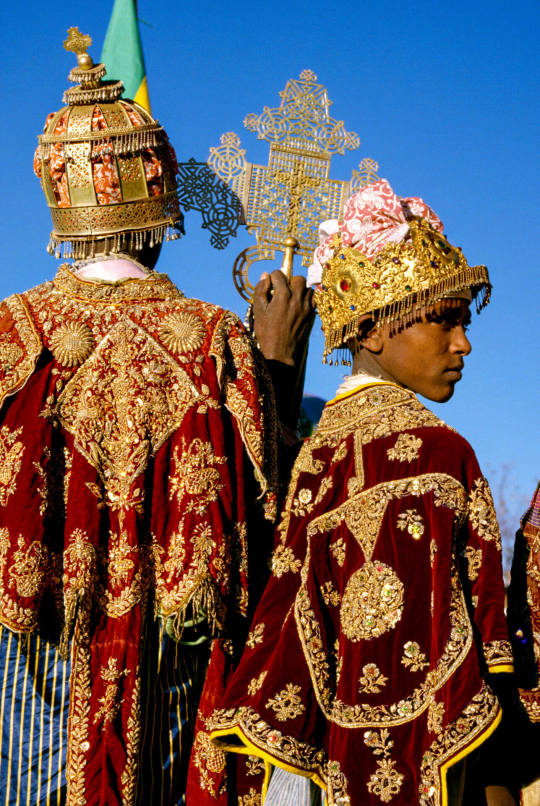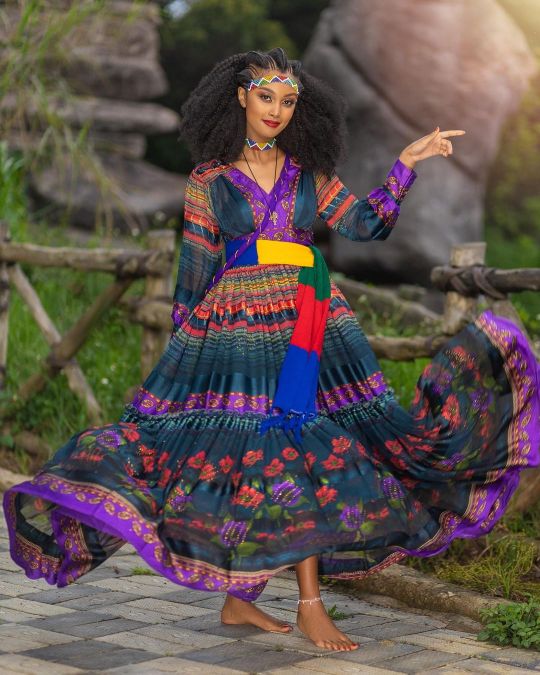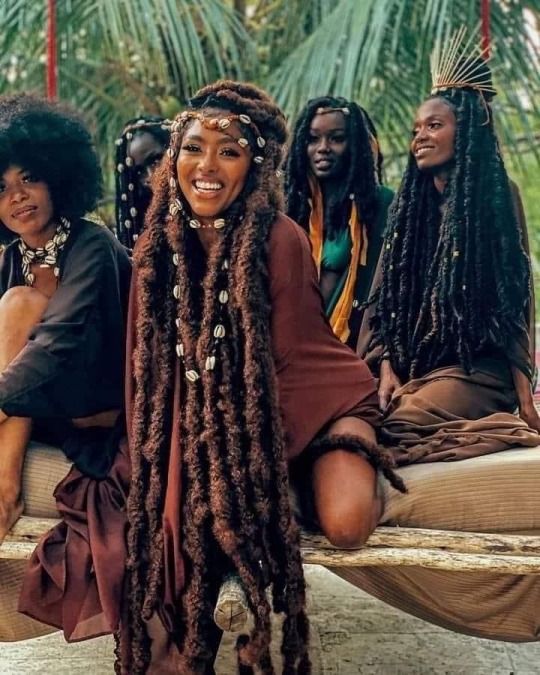#ethiopian fashion
Explore tagged Tumblr posts
Text

Ethiopian Christians devotees, Ethiopia, by Africa Online Museum
#ethiopian#ethiopia#africa#folk clothing#traditional clothing#traditional fashion#cultural clothing#eastern africa
1K notes
·
View notes
Text



#melanin#pretty#blackgirlmagic#ethiopian#habesha#melanin poppin#african beauty#modest#modesty#womens fashion#black queen#black fashion#ebony#chocolate#brown skin#east africa#african
729 notes
·
View notes
Text



. ݁₊ ⊹ Aurora Choker ⊹ ݁˖ .
Made this gorgeous waterproof stainless steel choker featuring an iridescent Ethiopian Opal today 🌟 Etsy
#ethiopian opal#Opal#iridescent#jewelry#grunge#soft grunge#minimalistic#spiritual#silver jewelry#stainless steel#choker#stone#crystal#Opal choker#crystal choker#chunky choker#edgy#goth#gothic#style#fashion#goth fashion#grunge fashion#grunge jewelry#my jewelry
82 notes
·
View notes
Text

#aesthetic#fashion#classy#fashion model#luxury#2000s#black women#1990s#africa#photography#1940s#1960s#1970s#1950s#1980s#1930s#midcentury#artist of tumblr#artists on tumblr#art#donyale luna#african#afrocentric#ethiopia#ethiopian women
47 notes
·
View notes
Text

angel no wings
#alt black girl#2000s#fashion#aesthetic#luxury#alt girl#ethiopian#culture#gold jewelry#vintage#boho#earthy
9 notes
·
View notes
Text

Liya Kebede
Tom Ford SS 2011
#liya kebede#tom ford#spring summer#ready to wear#2011#new york fashion week#black girl#black supermodels#ethiopian model
8 notes
·
View notes
Text
London, Sweden,.... Africa
#african beauty#african style#african women#african fashion#dark skin beauty#afro sexy#african smile#ethiopian#ethiopia#swedish#sweden#london#chick
5 notes
·
View notes
Text

2 notes
·
View notes
Text
instagram
#fashionaccessories#fashion#fashioneditorial#fashionbloggers#trending#accessories#lifestyle#Ethiopian#Instagram
0 notes
Text
I must explain to my American followers. Follow me on this thought experiment.
Read these questions. You do not need to answer, just read them.
Who is the current head of government of Ethiopia?
Are they a king, queen, president, prime minister, dictator, or tsar?
Are they generally liked or generally disliked by their people? Why?
Are they seen as conventionally attractive?
What was their most recent scandal?
What’s a weird outfit they’ve worn while in office?
What are their interior design preferences?
Has anyone tried to assassinate them? How many times?
What’s their favourite food?
Does Ethiopia have a national anthem?
What are the top 3 most iconic symbols of Ethiopia?
What’s the most prevalent religion in Ethiopia?
What are 5 Ethiopian TV series?
What languages are spoken in Ethiopia?
What are 5 Ethiopian celebrities?
Can you draw the Ethiopian flag?
What are 5 rights or privileges granted to citizens of Ethiopia?
What structure do Ethiopian school systems follow?
What are 5 Ethiopian foods?
What are 5 Ethiopian exports?
What countries are allied with Ethiopia?
What is one topic in Ethiopia that you are more educated on than in America?
What are 3 Ethiopian stereotypes?
Does Ethiopia have States, Provinces, or neither?
Where is Ethiopia’s government capital?
What currency is used in Ethiopia?
What animal is the Ethiopian symbol? Do they have one?
What is Ethiopia’s ethnic majority?
Who was their first government leader of Ethiopia? What is an interesting fact about them?
Who has Ethiopia gone to war against? Why?
Can you name 3 wars Ethiopia was involved in?
Can you name 3 Ethiopian women famous for their beauty?
What is the current Ethiopian political climate?
What areas of Ethiopia are considered rural or urban?
Can you name 3 major Ethiopian landmarks?
Can you name 3 Ethiopian amusement parks?
Can you name 3 Ethiopian national parks?
Can a civilian openly carry a gun in Ethiopia?
At what age can a person begin drinking Alcohol in Ethiopia?
What is the age of consent in Ethiopia?
Can you name 3 infamous Ethiopian criminals?
Can you name 3 Ethiopian comedians?
What was the most recent major natural disaster to hit Ethiopia?
Is Ethiopian culture as a whole generally considered more conservative or more progressive than your own?
Roughly how much money goes into the Ethiopian military budget? Millions or billions?
What are the staple crops in Ethiopia?
What is something that was invented in Ethiopia?
Who are 3 famous Ethiopian businessmen?
What are 5 wildly popular Ethiopian musicians?
What was one viral fashion trend among Ethiopian youth?
If you could correctly answer around 40 of these, then congratulations! That is what every other English speaker feels like living in proximity to America
That is the extent to which American media leeches into everything
Yes, it is weird
6K notes
·
View notes
Text

#melanin#pretty#blackgirlmagic#modest#muslim fashion#modesty#muslimah#melanin poppin#african beauty#black queen#black fashion#ebony#chocolate#brown skin#pretty face#headwraps#beautiful skin#ethiopian#womens fashion#poetry
222 notes
·
View notes
Text
Naming International POC Characters: Do Your Research.
This post is part of a double feature for the same ask. First check out Mod Colette's answer to OP's original question at: A Careful Balance: Portraying a Black Character's Relationship with their Hair. Below are notes on character naming from Mod Rina.
~ ~ ~
@writingraccoon said:
My character is black in a dungeons and dragons-like fantasy world. His name is Kazuki Haile (pronounced hay-lee), and his mother is this world's equivalent of Japanese, which is where his first name is from, while his father is this world's equivalent of Ethiopian, which is where his last name is from. He looks much more like his father, and has hair type 4a. [...]
Hold on a sec.
Haile (pronounced hay-lee), [...] [H]is father is this world’s equivalent of Ethiopian, which is where his last name is from.
OP, where did you get this name? Behindthename.com, perhaps?

Note how it says, “Submitted names are contributed by users of this website. Check marks indicate the level to which a name has been verified.” Do you see any check marks, OP?
What language is this, by the way? If we only count official languages, Ethiopia has 5: Afar, Amharic, Oromo, Somali, & Tigrinya. If we count everything native to that region? Over 90 languages. And I haven't even mentioned the dormant/extinct ones. Do you know which language this name comes from? Have you determined Kazuki’s father’s ethnic group, religion, and language(s)? Do you know just how ethnically diverse Ethiopia is?
~ ~ ~
To All Looking for Character Names on the Internet:
Skip the name aggregators and baby name lists. They often do not cite their sources, even if they’re pulling from credible ones, and often copy each other.
If you still wish to use a name website, find a second source that isn’t a name website.
Find at least one real life individual, living or dead, who has this given name or surname. Try Wikipedia’s lists of notable individuals under "List of [ethnicity] people." You can even try searching Facebook! Pay attention to when these people were born for chronological accuracy/believability.
Make sure you know the language the name comes from, and the ethnicity/culture/religion it’s associated with.
Make sure you understand the naming practices of that culture—how many names, where they come from, name order, and other conventions.
Make sure you have the correct pronunciation of the name. Don’t always trust Wikipedia or American pronunciation guides on Youtube. Try to find a native speaker or language lesson source, or review the phonology & orthography and parse out the string one phoneme at a time.
Suggestions for web sources:
Wikipedia! Look for: “List of [language] [masculine/feminine] given names,” “List of most common [language] family names,” “List of most common surnames in [continent],” and "List of [ethnicity] people."
Census data! Harder to find due to language barriers & what governments make public, but these can really nail period accuracy. This may sound obvious, but look at the year of the character's birth, not the year your story takes place.
Forums and Reddit. No really. Multicultural couples and expats will often ask around for what to name their children. There’s also r/namenerds, where so many folks have shared names in their language that they now have “International Name Threads.” These are all great first-hand sources for name connotations—what’s trendy vs. old-fashioned, preppy vs. nerdy, or classic vs. overused vs. obscure.
~ ~ ~
Luckily for OP, I got very curious and did some research. More on Ethiopian & Eritrean naming, plus mixed/intercultural naming and my recommendations for this character, under the cut. It's really interesting, I promise!
Ethiopian and Eritrean Naming Practices
Haile (IPA: /həjlə/ roughly “hy-luh.” Both a & e are /ə/, a central “uh” sound) is a phrase meaning “power of” in Ge’ez, sometimes known as Classical Ethiopic, which is an extinct/dormant Semitic language that is now used as a liturgical language in Ethiopian churches (think of how Latin & Sanskrit are used today). So it's a religious name, and was likely popularized by the regnal name of the last emperor of Ethiopia, Haile Selassie (“Power of the Trinity”). Ironically, for these reasons it is about as nationalistically “Ethiopian” as a name can get.
Haile is one of the most common “surnames” ever in Ethiopia and Eritrea. Why was that in quotes? Because Ethiopians and Eritreans don’t have surnames. Historically, when they needed to distinguish themselves from others with the same given name, they affixed their father’s given name, and then sometimes their grandfather’s. In modern Ethiopia and Eritrea, their given name is followed by a parent’s (usually father’s) name. First-generation diaspora abroad may solidify this name into a legal “surname” which is then consistently passed down to subsequent generations.
Intercultural Marriages and Naming
This means that Kazuki’s parents will have to figure out if there will be a “surname” going forward, and who it applies to. Your easiest and most likely option is that Kazuki’s dad would have chosen to make his second name (Kazuki’s grandpa’s name) the legal “surname.” The mom would have taken this name upon marriage, and Kazuki would inherit it also. Either moving abroad or the circumstances of the intercultural marriage would have motivated this. Thus “Haile” would be grandpa’s name, and Kazuki wouldn’t be taking his “surname” from his dad. This prevents the mom & Kazuki from having different “surnames.” But you will have to understand and explain where the names came from and the decisions dad made to get there. Otherwise, this will ring culturally hollow and indicate a lack of research.
Typically intercultural parents try to
come up with a first name that is pronounceable in both languages,
go with a name that is the dominant language of where they live, or
compromise and pick one parent’s language, depending on the circumstances.
Option 1 and possibly 3 requires figuring out which language is the father’s first language. Unfortunately, because of the aforementioned national ubiquity of Haile, you will have to start from scratch here and figure out his ethnic group, religion (most are Ethiopian Orthodox and some Sunni Muslim), and language(s).
But then again, writing these characters knowledgeably and respectfully also requires figuring out that information anyway.
~ ~ ~
Names and naming practices are so, so diverse. Do research into the culture and language before picking a name, and never go with only one source.
~ Mod Rina
#asks#language#languages#linguistics#east africa#african#immigration#ethiopian#names#naming#research#resources#writeblr#character names#character name ideas#rina says read under the cut. read it
4K notes
·
View notes
Text


Drawing of Andromeda and Perseus
I tried using the old depiction of Medusa, if I were to draw it again, I think I'll use a different color palette
Perseus is based on the typical Minoan style.
For Andromeda, I decided that I wanted to show off some fashion from the region, instead of the traditional nude. However I didn't want to depict her wearing her full royal garb, so I settled on a more sober dress that would've been considered more mainstream. I was hesitating a bit between Ethiopian and Nubian (Kerma) influences, so I decided to base her hair on a modern traditional hairstyle from Ethiopia, as a reference to the ancient namesake. I'll draw a version later of Andromeda in full royal garb.
#digital drawing#illustration#digital art#digital illustration#original art#greek mythology#greek myth art#greek myth#ancient greece#perseus#andromeda#persomeda#perseus and andromeda#medusa#gorgon
90 notes
·
View notes
Text

𝗗𝗥𝗘𝗔𝗗𝗟𝗢𝗖𝗞𝗦
In the 1930s, dreadlocks were a fashionable hairstyle among Rastafarians. The Rastafarian movement, which originated in Jamaica, is based on a blend of Christian and African spiritual ideas. Rastafarians believe that their hair represents the power and energy of their African ancestors, and they wear dreadlocks to reflect this belief. Dreadlocks are religious, but they have also become a sign of defiance and counterculture.
In the 1960s and 1970s, hippies and other groups who didn't like mainstream culture liked to wear dreadlocks. People have used locs for a variety of reasons throughout history. The Maasai warriors of Africa, for example, are renowned for wearing long, thin red dreadlocks dyed with red root extracts or red ochre. However, in Nigeria, infants who are born with naturally locked hair are referred to as "Dada" by the Yoruba.
The Rastafari movement thinks that dreadlocks are a sign of the Lion of Judah, which sometimes shows up on the Ethiopian flag. Rastafari supporters believe that Haile Selassie is a direct descendant of King Solomon and Queen Sheba through their son Menelik I and that the Nazarites recorded in the Bible inspired them to wear dreadlocks.
People of all races and ethnicities now sport dreadlocks as a fashionable hairstyle in many parts of the world. While they have religious and cultural value for some, many individuals just wear them as a fashion statement. Despite their rising popularity, dreadlocks have caused controversy and prejudice.
They have been outlawed in several businesses and schools, and some people have encountered prejudice due to their haircut. In the end, the history of dreadlocks is long and varied. They have deep roots in ancient cultures and are still important to culture today.
86 notes
·
View notes
Text

November 5th, 1985, Royal Albert Hall, London, UK - Freddie Mercury with Jane Seymour (actress) at "Fashion Aid", for Ethiopian Famine Appeal Fund
- Fashion Aid was created as an alternate funding initiative following on from the success of Live Aid earlier in the same year. Bob Geldof and his wife Paula Yates decided it would be an idea to bring together top artistic talent from the fashion world and the world of music to raise funds for Ethiopia -
#jane seymour#freddie mercury#queen band#london#zanzibar#legend#queen#brian may#john deacon#freddiebulsara#roger taylor#1985#royal albert hall#uk#bob geldof#fashion aid#november 5th
24 notes
·
View notes



